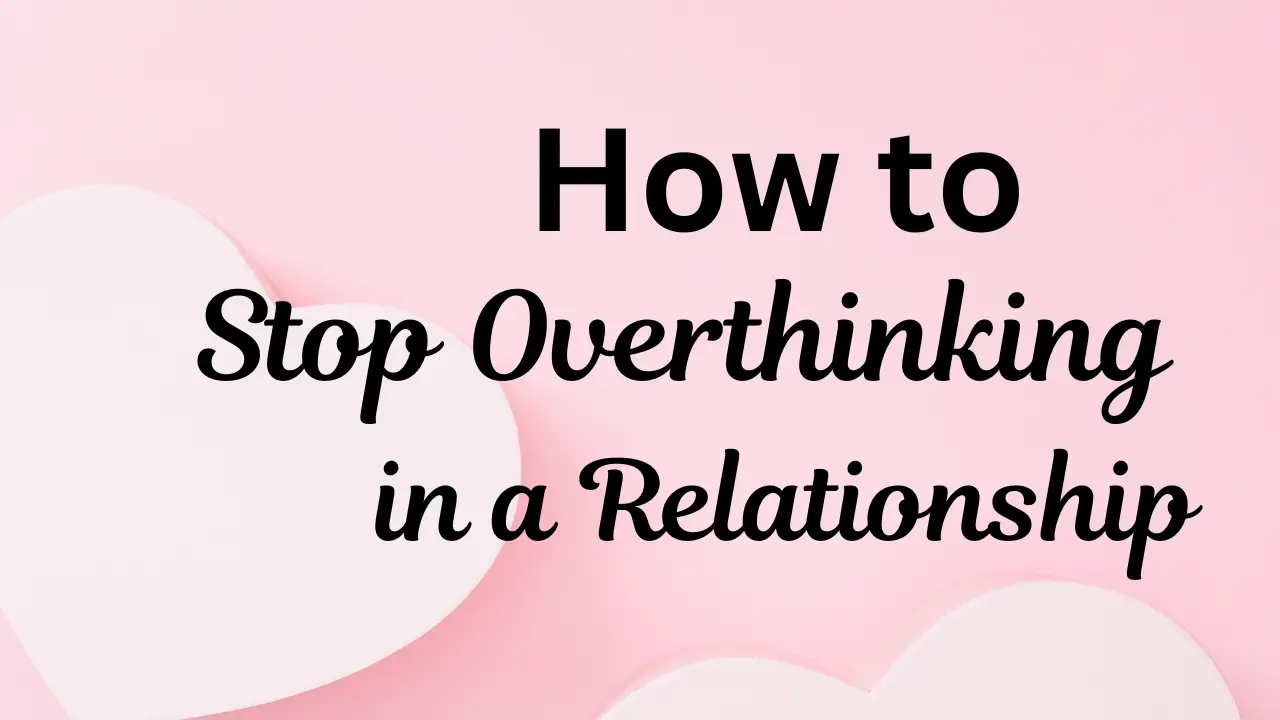How to Stop Overthinking in a Relationship: 15 Heartfelt and Practical Tips

Overthinking in a relationship can be emotionally draining, leading you down a spiral of endless worries, assumptions, and self-doubt. Every word, action, or silence can feel like a puzzle you need to solve, and the constant overanalyzing can cause anxiety and create distance between you and your partner.
But take a deep breath—you’re not alone in this. Many people overthink, especially when they care deeply about their relationship. However, it’s important to know that overthinking can be managed, and by embracing some practical tips, you can regain emotional balance. Let’s explore 15 comforting and practical ways to stop overthinking in your relationship.
1. Acknowledge Your Feelings
Before you can tackle overthinking, you need to recognize it for what it is. It’s completely natural to have doubts and worries in a relationship from time to time, but when these thoughts start taking over, they can cloud your judgment. Acknowledging your feelings is the first and most vital step. Instead of trying to push away your emotions or pretend they don’t exist, allow yourself to feel them fully. By giving your emotions space, you reduce their power over you.
Once you’ve recognized these feelings, remind yourself that thoughts aren’t always facts. Overthinking tends to create scenarios that aren’t grounded in reality, often stemming from past experiences or insecurities. It’s okay to feel uncertain, but don’t let those feelings dictate your actions. Reassure yourself that just because you’re feeling anxious doesn’t mean something is wrong. It’s just your mind reacting to fear, and that’s something you can gently calm down.
2. Trust Your Partner’s Intentions
Overthinking often stems from doubting your partner’s intentions, even when there’s no solid reason to. You might start questioning whether they care about you as much as you care about them, or wonder if a harmless action means something more. But remember, trust is the foundation of any healthy relationship, and by doubting your partner, you’re indirectly harming that foundation. Trust that your partner’s actions come from a place of love and care, not from a place of deception or malice.
Give your partner the benefit of the doubt. If they’ve shown you love and commitment, believe that they have your best interests at heart. Reassure yourself that it’s okay to feel vulnerable—it’s part of being in a relationship. When you find yourself spiraling into doubt, gently remind yourself that overthinking can distort reality, and choose to trust the bond you’ve built with your partner.
3. Communicate Openly, Not Constantly
Communication is essential in a relationship, but there’s a fine line between communicating and over-communicating. Overthinking can push you to seek constant reassurance, leading you to bring up every minor concern in the relationship. While talking about your feelings is important, too much can overwhelm both you and your partner. You don’t need to address every single worry that pops into your head—save discussions for what truly matters.
Instead of bombarding your partner with every fear, take time to process your thoughts. Ask yourself if the issue at hand is something that needs to be addressed or if it’s your mind playing tricks on you. When you do communicate, be open and honest, but also be mindful. Sometimes, simply having a calm, loving conversation can provide the clarity you need, without feeding the cycle of overthinking.
4. Challenge Negative Thoughts
Negative thoughts have a way of creeping in, convincing you that your relationship is in danger when it’s not. Overthinking thrives on negativity, often making you assume the worst. The next time a negative thought enters your mind, don’t automatically accept it as truth. Instead, challenge it by asking yourself, “Is this thought based on facts, or is it an assumption?” More often than not, you’ll realize that these thoughts are based on fear, not reality.
To help break the cycle, write down your negative thoughts and then counter them with evidence. For example, if you’re thinking, “They don’t love me anymore because they didn’t text me back right away,” write it down and then counter it with, “They might be busy, and they’ve always shown love in other ways.” Replacing negativity with a more balanced perspective can gradually help you see things in a more rational and loving light.
5. Focus on the Present, Not the Past
One of the biggest causes of overthinking is dragging past experiences into the present. You might overanalyze your partner’s actions because of past relationships where you were hurt or betrayed. It’s natural to be cautious after being hurt, but projecting past pain onto your current relationship isn’t fair to you or your partner. Letting go of the past can be hard, but it’s necessary if you want your relationship to flourish.
Remind yourself that this is a new chapter. Just because something went wrong in the past doesn’t mean it will happen again. Focus on the present moment and the love and connection you have now. When you catch yourself worrying about history repeating itself, pause and remind yourself that the person you’re with is not the same as the one who hurt you before. Give your relationship a chance to grow without being weighed down by past fears.
6. Remember, No One Is Perfect
Overthinking can often be fueled by unrealistic expectations—either of yourself, your partner, or the relationship as a whole. You might expect everything to be flawless, and when things don’t go perfectly, you start overanalyzing every little detail. But the truth is, no one is perfect, and no relationship is without its ups and downs. It’s okay to have bumps along the way.
Accepting that imperfection is part of love can be incredibly freeing. When you allow yourself and your partner the grace to make mistakes, you reduce the pressure on both of you. Instead of overthinking every misstep, embrace the imperfections as part of the beautiful, evolving journey you’re on together. The more you can accept that relationships are about growth, not perfection, the more peace you’ll find.
7. Set Personal Boundaries with Your Thoughts
Just as you set boundaries with people, it’s crucial to set boundaries with your thoughts. Overthinking can happen when you allow your mind to wander without limits. If you notice your thoughts spiraling out of control, stop and set a boundary with yourself. Tell yourself, “I won’t spend more than five minutes thinking about this,” or “I’ll revisit this later when I’m calmer.”
These mental boundaries give you a sense of control. When you place limits on your overthinking, it’s easier to prevent it from taking over your life. This doesn’t mean suppressing your thoughts—it’s about managing them in a healthy way. Over time, you’ll notice that these boundaries help create more mental peace and emotional clarity, allowing you to focus on what truly matters in your relationship.
8. Engage in Activities That Ground You
When your mind is constantly racing, grounding yourself in physical activities can be a lifesaver. Whether it’s going for a walk in nature, practicing yoga, or painting, engaging in something that brings you peace can help pull you out of the overthinking spiral. Physical activities take you out of your head and bring you back into the present moment, which is crucial when you’re overwhelmed by thoughts.
Try to find activities that not only distract you but also bring joy and fulfillment. This could be anything from gardening, cooking, or even dancing around your living room. The goal is to reconnect with yourself and remind your mind that it doesn’t have to work so hard. When you create moments of calm in your life, you’re better able to approach your relationship with a more relaxed and open heart.
9. Let Go of Control
Overthinking often stems from the need to control everything in a relationship—the future, your partner’s behavior, your own emotions. But love isn’t something you can control; it’s something you nurture and grow. When you constantly try to control the outcome, you stifle the natural flow of the relationship. It’s okay to let go and allow things to unfold organically.
Remind yourself that uncertainty is part of any relationship, and that’s what makes love so magical. Instead of worrying about what could go wrong, focus on what’s going right. By letting go of control, you give your relationship the freedom to evolve in beautiful and unexpected ways. Trust that everything will unfold as it’s meant to, and in the meantime, enjoy the ride.
10. Create a Safe Space for Yourself
Overthinking can make you feel emotionally vulnerable, so it’s essential to have a safe space where you can retreat and recharge. This space could be physical—like a cozy corner in your home—or emotional, such as a journal where you write down your thoughts. Having a designated safe space allows you to process your emotions without judgment or pressure.
When you feel overwhelmed by your thoughts, retreat to this space and give yourself permission to feel without acting on those feelings. Sometimes, simply stepping away from the situation and calming your mind can give you the clarity you need to move forward without overthinking.
11. Be Mindful of Your Expectations
Overthinking can often be driven by unrealistic or unspoken expectations of your partner and the relationship. You might expect them to always know what you need or to react in a specific way. However, expecting perfection sets both of you up for disappointment and overanalysis. It’s important to recognize that these expectations can create unnecessary stress and misunderstandings.
Instead, strive for realistic and clear communication about your needs and expectations. Understand that your partner is also learning and growing, and may not always meet your expectations perfectly. By acknowledging and adjusting your expectations, you can reduce the pressure on both yourself and your partner, creating a more relaxed and supportive environment where overthinking has less room to grow.
12. Practice Gratitude Daily
When overthinking starts to take hold, focusing on the positives in your relationship can shift your mindset. Practicing gratitude involves actively recognizing and appreciating the good things in your life, including your relationship. By making a habit of acknowledging what you love about your partner and your time together, you create a buffer against negative thoughts.
Each day, take a moment to reflect on what you’re grateful for—whether it’s a small act of kindness from your partner or a joyful moment you shared. This practice not only helps counteract overthinking but also strengthens your bond by fostering a positive and appreciative outlook. Gratitude reminds you of the love and connection you share, making it easier to dismiss unnecessary worries.
13. Focus on Your Happiness, Not Their Behavior
It’s easy to let your happiness become entwined with your partner’s actions or behavior. When you overthink, you might find yourself constantly evaluating whether they’re doing enough to make you happy. However, true contentment comes from within, not from external sources. Instead of depending on your partner for happiness, focus on nurturing your own joy and well-being.
Engage in activities that bring you personal fulfillment and make you feel good about yourself. By cultivating your own happiness, you’re less likely to overanalyze your partner’s behavior and more likely to appreciate the relationship for what it is. Remember, a healthy relationship involves two people who are both content and fulfilled independently of each other.
14. Understand That Overthinking Hurts You Both
Overthinking doesn’t just affect you—it can also take a toll on your partner and the relationship as a whole. When you’re caught in a cycle of doubt and analysis, it can create emotional distance and tension. Your partner might feel confused or frustrated by your constant need for reassurance or your shifting moods.
By recognizing that overthinking is detrimental to both you and your partner, you can motivate yourself to break the cycle. Approach your relationship with the understanding that your well-being impacts the well-being of the relationship. Take steps to manage your thoughts and communicate constructively, thereby fostering a healthier, more supportive connection for both of you.
15. Remind Yourself Why You Fell in Love
In moments of overthinking, it can be helpful to reconnect with the core reasons why you fell in love in the first place. Reflect on the qualities and experiences that drew you to your partner. This practice helps shift your focus from doubts and insecurities to the positive aspects of your relationship.
Consider writing down what you love about your partner and your relationship, and revisit this list whenever overthinking starts to creep in. This can provide a comforting reminder of the love and connection you share, reinforcing your bond and easing your worries. Remember, love is about celebrating the good moments and embracing the journey together, imperfections and all.
By implementing these tips, you can begin to break free from the cycle of overthinking and cultivate a more peaceful, fulfilling relationship. It’s important to be kind to yourself and recognize that overcoming overthinking is a gradual process. With patience and practice, you’ll find a deeper sense of calm and joy in your relationship, allowing you to fully enjoy the love and connection you have.






